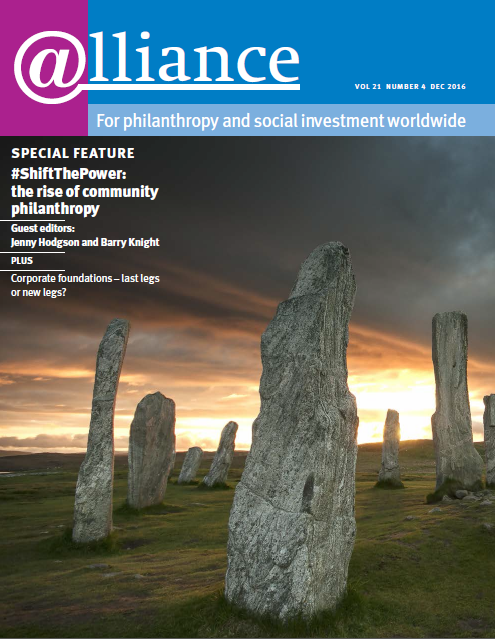As a human rights advocate I am grieved by our limited success in building strong and active human rights constituencies even in places where promoting human rights is not dangerous. Indeed, we have yet to effectively reach and engage the vast majority of the world’s communities in embracing – let alone claiming – human rights. To do so, there is much we can learn from the work of community philanthropy organizations (CPOs). There is also much that we can contribute to their vital efforts.
I’m going to make a bold claim: communities that are hostile or indifferent to human rights either do not know what they are or benefit from denying others the rights they already enjoy themselves. In that enormous space of communities that simply do not know there is tremendous opportunity for us to make genuine advances by simultaneously building human rights constituencies and supporting CPOs to realize inclusive and resilient communities.
However, first we must tackle some pervasive misconceptions that contribute to delaying the widespread public embrace of human rights, including in the global north. Two in particular have been especially damaging, both of which, regrettably, have been perpetuated by human rights practitioners, but both of which, community philanthropy can help to dispel.
The cost of weak or absent human rights constituencies is increasingly apparent in both North and South.
The first is the view that human rights is practised primarily in courts, in capitals or in UN bodies, far from where people live, work, raise families, age and die. Communities that never have an opportunity to see human rights practitioners at work are unlikely to know, let alone value, what these advocates do on their behalf. By contrast, CPOs’ priorities and concerns revolve around communities’ wellbeing, including jobs, housing, health, education, the environment. By helping those communities see the elements of justice, equality and other rights in those questions, CPOs can help demonstrate that human rights are everybody’s concern, everywhere.
A second factor is the dominant and distorted version of human rights that puts civil and political rights above economic, social and cultural rights. This has hobbled our efforts to reach and engage communities effectively. CPOs already have that reach and that engagement and the questions that concern them and their constituents are as likely to involve economic, social and cultural considerations as they are to involve political rights. It’s up to us as human rights activists to make use of the access they provide to communities.
These practices and misconceptions together have delayed communities’ appreciation of the relevance and value of human rights to their lives. Governments and others have been only too eager to fill the gap, reducing human rights in people’s minds to the protection of criminals and terrorists, support for ‘the other’, promotion of foreign values or furthering foreign interests. Human rights advocates must help correct these and other distortions that delay communities’ embrace of human rights in the global north and south equally.
In fact, the cost of weak or absent human rights constituencies is increasingly apparent in both North and South. In Europe, challenges to the European Convention on Human Rights and the rise of a xenophobic right that is mobilizing communities against immigrants and refugees are evidence of the fragility of communities’ embrace of human rights. These are also indications of the limits of liberalism that is wrongly treated as synonymous with the universalism of human rights. And, throughout the world, women, minorities and poor people continue to be marginalized and excluded from larger communities.
By helping those communities see the elements of justice, equality and other rights in those questions, CPOs can help demonstrate that human rights are everybody’s concern, everywhere.
Clearly, as human rights advocates we need to invest our attention, efforts and resources there, inside communities, learning their concerns and priorities and building their capacities to act on these together. This is precisely what CPOs do, and we have much to learn from their vital work to empower communities by cultivating local assets and building local capacities. For their part, human rights advocates can support CPOs to address the discrimination and inequality that fuel exclusion and marginalization and weaken the community as a whole. By doing so, we can demonstrate the vision and value of human rights, including in building inclusive, healthy and cohesive communities that do not fear diversity and recognize equality as the basis of genuine security – human rights constituencies in action.
Mona Younis is a human rights advocate and consultant. Email mnyounis@gmail.com








Comments (0)